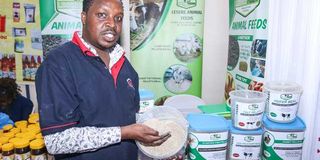Feed maker urges state to reduce taxes

Isaac Lesere Yego, proprietor of Lesere Animal Feed during the 2022 Nairobi International Trade Fair.
About five years ago, Isaac Lesere Yego thought of helping his parents reduce the cost of milk production in Eldoret, Uasin Gishu County.
“I dreamt of a way of processing feeds cheaply,” he says.
The 34-year-old adds that he traversed farms in Mt Kenya and the Rift Valley in search of a solution.
“I went to Chris Murungaru, Joshua Kulei, Egerton University and Chepkoilel Campus farms,” he says.
The challenge was how to come up with a formula for cheaper feeds than what his parents were used to. He discovered that feeds in those farms are made from locally available raw materials.
Before then, Yego grew pasture and supplied hay to contracted farmers in Uasin Gishu. Because of the business, Yego had adequate skills and knowledge of livestock feeds.
In 2018, Yego started a high-yielding dairy meal project with a capital of Sh525,000. The money was from his savings.
“The reception was exemplary,” says the now-established feeds processor.
Four years later, his ideas and diligence are a solution for farmers, especially as many grapple with the high cost of animal feeds and production.
Apart from formulating dairy meals, Yego has advanced to poultry, goat, dog, fish, horse and rabbit feeds.
A majority of farmers in Kenya rely on imported feeds.
Importing a mixer machine, an extruder and pelleting cost Yego about Sh4 million.
The owner of Lesere Animal Feed has a workshop in Eldoret that comprises a processor. Raw materials are sourced locally.
Formula software
“Initially, I was buying formula from a nutritionist but I came up with a software that does so,” says the Computer Science degree holder from the University of Nairobi.
Yego says the system analyses raw materials available and puts them in the database.
“I run required raw materials through the software, which allows the formulation of any kind of feed,” he says, adding that the innovation is a game-changer in the dairy industry.
He sources guidelines on the composition of nutrients from the Kenya Bureau of Standards.
All the raw materials must go through a mixer.
The raw materials and nutrients used are cotton and sunflower cake, soya, wheat products, barley, rice seeds, omena, black soldier flies and lime.
Walter Itiru, an expert in animal feed processing, says business is tough due to the high cost of raw materials.
“We import nearly all raw materials but a rise in the cost of shipping is crippling processors and manufacturers. We welcome the lifting of the GMO products ban, but the government should introduce subsidies in the livestock industry,” the founder of Masters Manufacturers Kenya Ltd says.
The Wangige, processor, in Kiambu County, formulates feeds for all domestic animals.
Yego’s feeds are packaged in 5, 10, 20 and 50kg volumes. He says the profit margin is minimal.
“The production cost of a 50-kilo bag is Sh2,700 to Sh3,000 but it sells for ShSh3,000 to Sh3,100,” he says.
He supplies dairy and pig feed in Uasin Gishu, rabbit feed in Mount Kenya, horse feed in Nakuru and Nairobi and fish feed in Nyanza and Western Kenya. Yego has a network of 300-400 farmers.
The feed processor was among the exhibitors at last year’s Nairobi International Trade Fair organised by the Agricultural Society of Kenya.
During the exhibition, Yego told Seeds of Gold that high taxes and levies on animal feed and raw materials threaten his business.
“We struggle financially while competing with the big boys,” he says.





